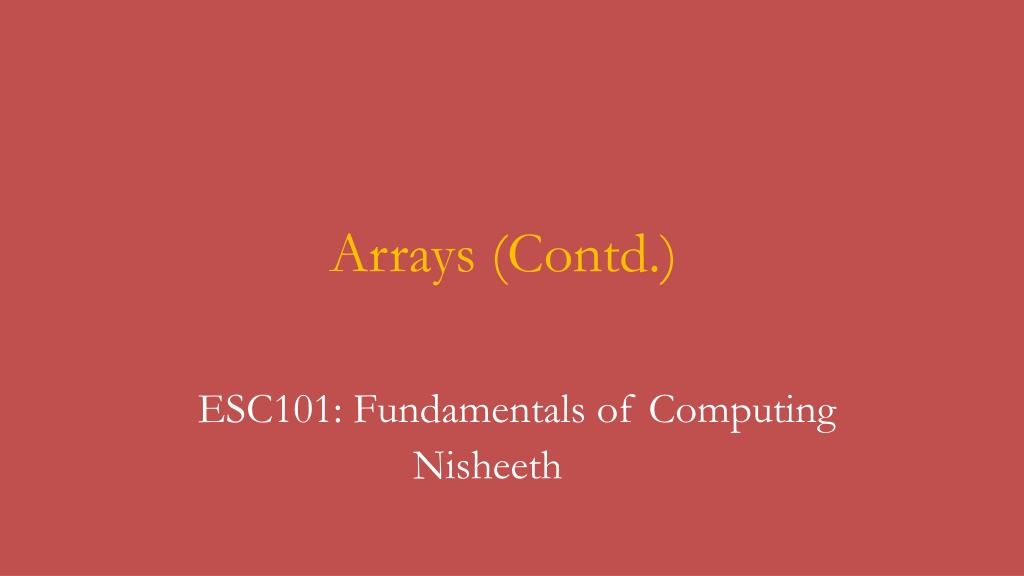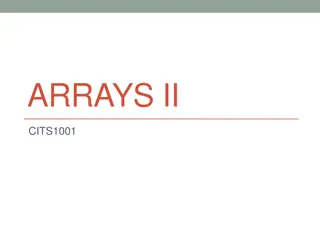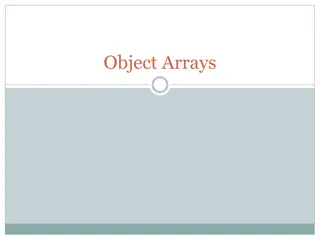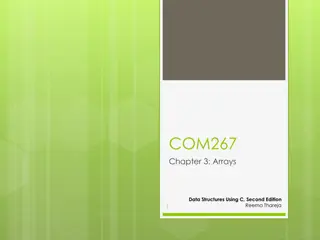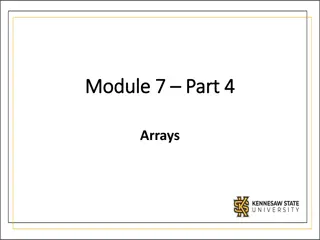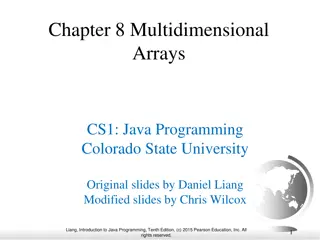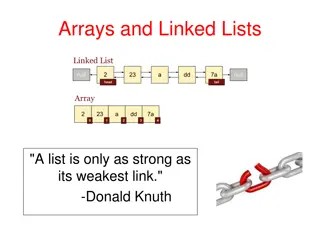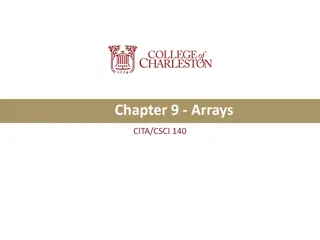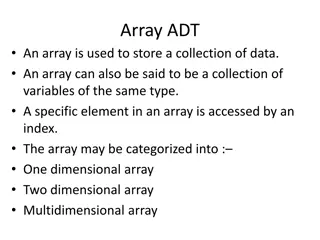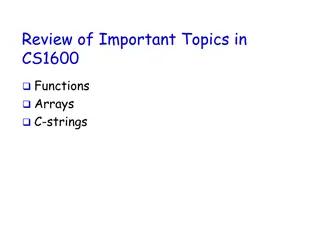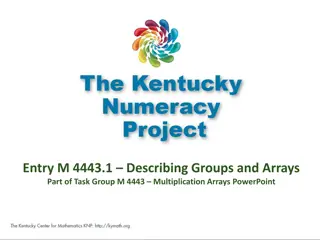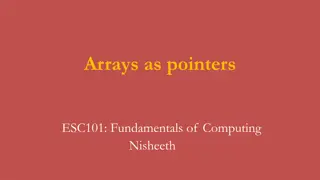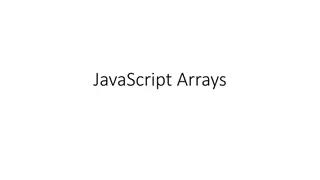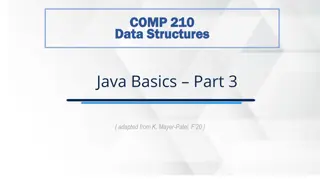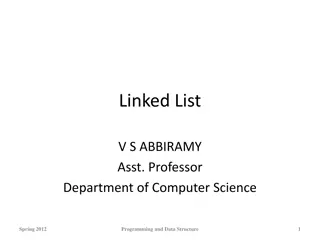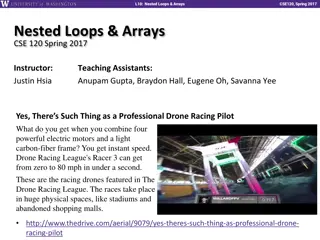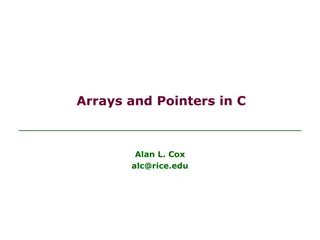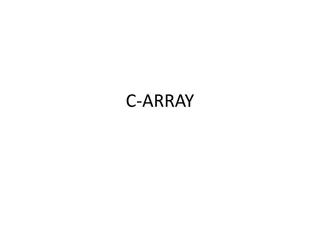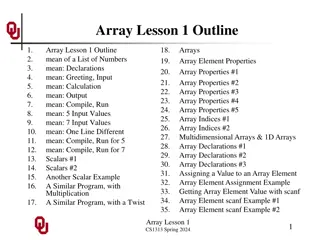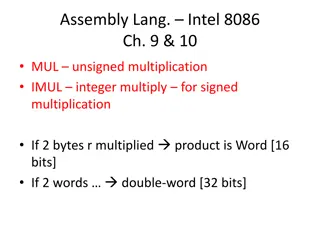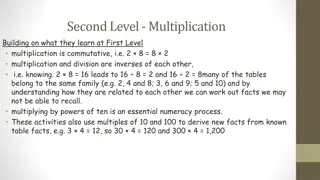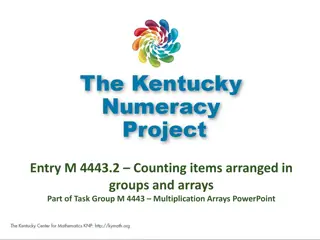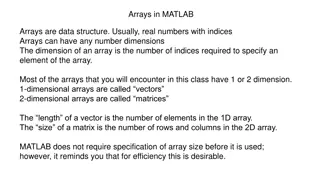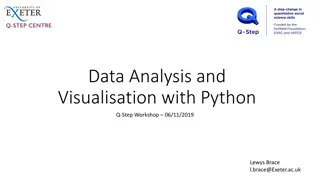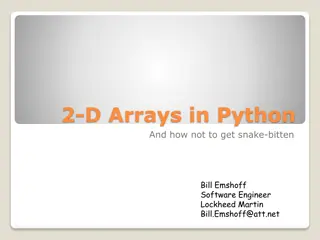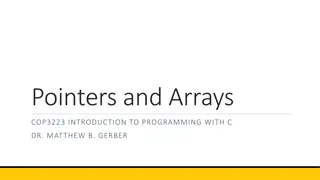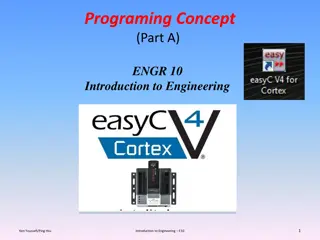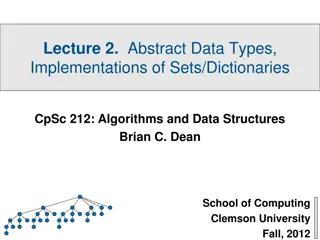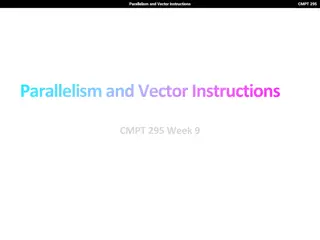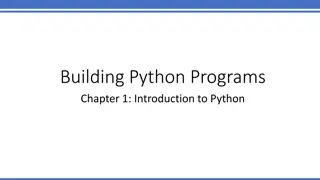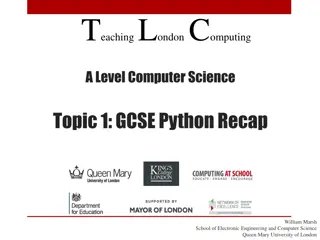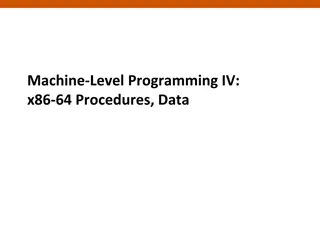Understanding Arrays in Computer Programming
Arrays in programming are collections of elements that have the same data type. Elements in an array are accessed using integer-valued indices. Arrays inescapably play a crucial role in programming as they allow for efficient storage and manipulation of data. Initialization, declaration, and utilization of arrays are key aspects to mastering this fundamental concept.
Download Presentation

Please find below an Image/Link to download the presentation.
The content on the website is provided AS IS for your information and personal use only. It may not be sold, licensed, or shared on other websites without obtaining consent from the author. Download presentation by click this link. If you encounter any issues during the download, it is possible that the publisher has removed the file from their server.
E N D
Presentation Transcript
Arrays (Contd.) ESC101: Fundamentals of Computing Nisheeth
Recap: Arrays A collection of elements all of which have the same data type float marks[500]; marks[499] marks[0] marks[1] marks[2] Each array element is accessed using the array index (integer-valued) For the above example, marks[0], marks[2], marks[499], marks[int_expr] where int_expr is integer-valued expression such that 0 <= int_expr <= 499 2
Recap: Array: Declaration and Initialization Can be initialized at time of declaration itself int a[6] = {3,7,6,2,1,0}; a 3 7 6 2 1 0 Can be partly initialized as well int a[6] = {3,7,6}; a 3 7 6 Over initialization may crash int a[6] = {1,2,3,4,5,6,7,8,9}; No need to specify the array size during declaration I will figure out how much space needed Better way to initialize is the following int a[] = {1,2,3,4,5,6,7,8,9}; Warning: uninitialized arrays contain garbage, not zeros 3
Array: Declaration and Initialization Can declare the array first and initialize its elements later The later initialization can be done using user-provided values (e.g., using scanf), or some expression, or using some fixed values Can I run the loop as for(i=1;i<=5;i++)? int i,tmp,a[5]; for(i=0;i<5;i++){ scanf( %d ,&tmp); a[i] = tmp; } Read a use- provided value Assign the read value to the ith element of the array Yes, if you use a[i-1] = tmp; in loop s body 4
Array: Declaration and Initialization Can declare the array first and initialize its elements later The later initialization can be done using user-provided values (e.g., using scanf), or some expression, or using some fixed value Note: &a[i] is evaluated as &(a[i]) since [] has higher precedence than & int i,a[5]; for(i=0;i<5;i++){ scanf( %d ,&a[i]); } Directly read a user provided value into the ith element of the array (the tmp variable is not needed) A shortcut for reading user provided values 5
Operator Name Symbol/Sign Associativity Brackets, array subscript, Post increment/decrement (), [] ++, -- Left Unary negation, Pre increment/decrement, NOT -, ++, --, ! Right Multiplication/division/ remainder *, /, % Left Addition/subtraction +, - Left Relational <, <=, >, >= Left Relational ==, != Left AND OR && || Left Left Conditional ? : Right Assignment, Compound assignment =, +=, -=, *=, /=, %= Right 6
Array: Declaration and Initialization Can declare the array first and initialize its elements later The later initialization can be done using user-provided values (e.g., using scanf), or some expression, or using some fixed value 1 2 3 a[2] a[3] 4 5 int i,a[5]; for(i=0;i<5;i++){ a[i] = i+1; } a[4] a[0] a[1] Assign a value of expression i+1 to the ith element of the array 7
Array: Declaration and Initialization Can declare the array first and initialize its elements later The later initialization can be done using user-provided values (e.g., using scanf), or some expression, or using some fixed value 10 10 10 10 a[2] a[3] 10 a[0] a[1] int i,a[5]; for(i=0;i<5;i++){ a[i] = 10; } a[4] Assign a fixed (constant) value 10 to the ith element of the array 8
Tracing the execution of an array based program include <stdio.h> int main () { int a[5]; int i; for (i=0; i < 5; i= i+1) { a[i] = i+1; } return 0; } a[0] a[1] a[2] a[3] a[4] Let us trace the execution of the program. i 0 1 2 3 4 5 5 1 2 3 4 Statement becomes a[0] =0+1; Statement becomes a[1] =1+1; Statement becomes a[2] =2+1; Statement becomes a[3] = 3+1; Statement becomes a[4] = 4+1; 9
Arrays: Some Example Programs Create an integer array of size 100 Initialize elements with even index as 0 Initialize elements with odd index as 1 int i,a[100]; for(i=0; i<100; i=i+1){ if(i%2==0) a[i] = 0; else a[i] = 1; } Method 1 10
Arrays: Some Example Programs Create an integer array of size 100 Initialize elements with even index as 0 Initialize elements with odd index as 1 Incrementing the loop counter by 2 int i,a[100]; for(i=0; i<100; i=i+2){ a[i] = 0; a[i+1] = 1; } Method 2, without if-else This for loop will run 50 times. Each iteration will assign values to 2 elements, one at odd index, one at even index 11
Greek origin word: palin = again, dromos = direction Arrays: Some Example Programs Check whether a sequence of numbers is a palindrome sequence int main(){ int a[100], temp, len = 0, i, flag = 1; while(1){ scanf("%d", &temp); if(temp == -1) break; a[len++] = temp; } for(i = 0; i < len; i++) if(a[i] != a[len-i-1]) flag = 0; if(flag) printf("YES"); else printf("NO"); return 0; } Let s specify a maximum sequence size flag = 1 assumes that sequence is palindrome (set 0 if later found otherwise) Palindrome: Forward and Reverse gives the same sequence The while(1) loop keeps reading numbers until user enters -1, store each number as an element of the array named a This line does a[len] = temp; and then increments len Some palindromes: 1 2 3 4 5 4 3 2 1 1 2 3 3 2 1 After the while(1) loop exits, len is the size of the array (indices are 0 to len-1) Compares a[0] with a[len-1], then a[1] with a[len-2], and so on. If any pair does not match, set flag variable to 0 Some non-palindromes: 1 2 3 4 5 1 2 3 3 4 1 9 0 4 0 8 a[0] a[1] a[2] a[len-2] a[len-1] 11
Arrays: Some Example Programs #include <stdio.h> int main() { char s[100]; int count = 0; int ch; int i; ch = getchar(); while ( ch != EOF && count < 100) { s[count] = ch; count = count + 1; ch = getchar(); } i = count-1; while (i >=0) { putchar(s[i]); i=i-1; } Read until user has entered 100 chars or the end-of-file (EOF) special character has been read. /* the array of 100 char */ /* counts number of input chars read */ /* current character read */ /* index for printing array backwards */ Now print the characters in reverse order /*read_into_array */ getchar() returns a single character entered by the user /*print_in_reverse */ putchar() prints a single character return 0; } 13
Next Class Functions and arrays Passing by value Passing by reference ESC101: Fundamentals of Computing
